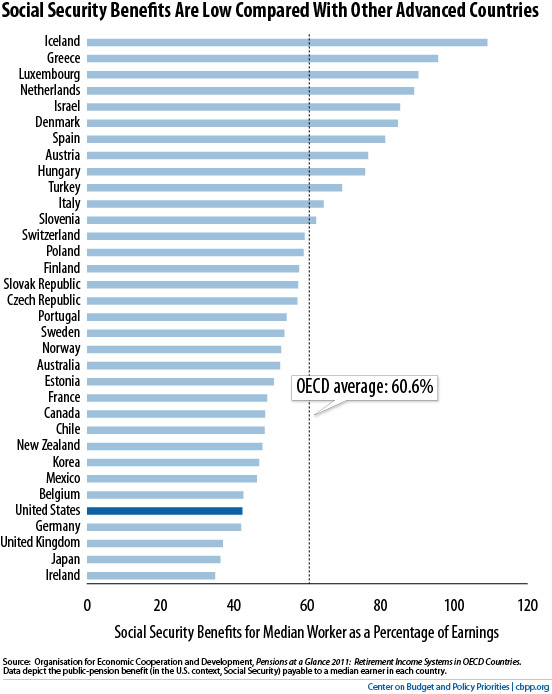off the charts
POLICY INSIGHT
BEYOND THE NUMBERS
BEYOND THE NUMBERS
Social Security: We’re Number…30!
Receive the latest news and reports from the Center
We’ve long emphasized that Social Security benefits are modest — averaging only about $1,100 a month for retirees, disabled workers, and widows. And they’re also low in relation to earnings. According to the Organisation for Economic Cooperation and Development, they replace just 42 percent of a median worker’s earnings. That puts us in 30th place among the 34 OECD member countries.
“So what?” argues our friend Andrew Biggs, who recently panned CBPP’s and other organizations’ use of these comparisons. Biggs notes that while the United States pays low benefits by international standards, it’s fairly typical of the Anglo-Saxon countries. Most Americans don’t care what Luxembourg does, says Biggs. He’s right that the United States is in good company among Anglo-Saxon nations, most of which are more parsimonious toward their retirees than nations that border the Mediterranean or the North Sea.

But that’s exactly why these international comparisons are useful. While some overly-generous countries are busy trimming their pension promises, that doesn’t mean that the United States needs to follow suit. In the Greek austerity program demanded as a condition of European Union aid, for example, the full-retirement age for women has been raised from 60 to 65 (matching the rule for men); early-retirement incentives have been tightened; Easter, Christmas and summer bonuses to retirees were curtailed; and pensions will be based on average rather than final salary. All of those former features are — ahem — foreign to the United States. To take just one example, we’ve already upped our full retirement age from 65 to 66, and will raise it further to 67 by 2022. The OECD data show that U.S. beneficiaries spend fewer years in retirement than citizens of most other developed countries.
The Center for Strategic and International Studies has devised a Global Aging Preparedness (GAP) index to rate various nations’ readiness for future demographic changes. CSIS observes that, thanks to its comparatively high birth rates and openness to immigration, the United States is graying less rapidly than many other nations. People age 60 or older will make up about a quarter of our population in 2040, a figure that several European countries and Japan have already surpassed. CSIS assigns a low priority to reducing public-pension (i.e., Social Security) benefits in the United States and other “Anglo” nations. Its top priority for the United States? Reining in future health-care cost growth. That’s exactly right.